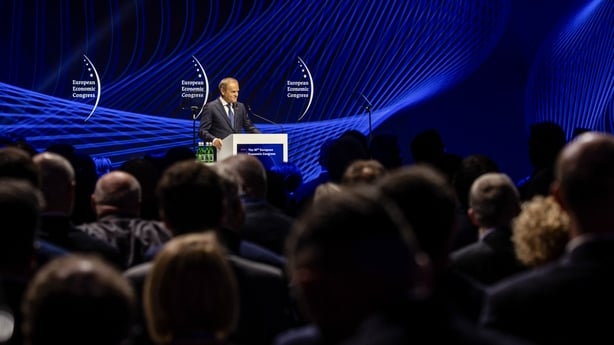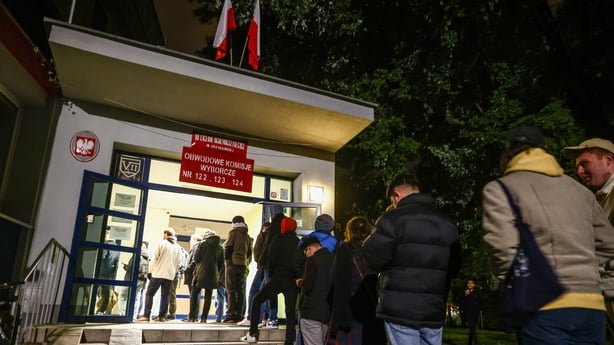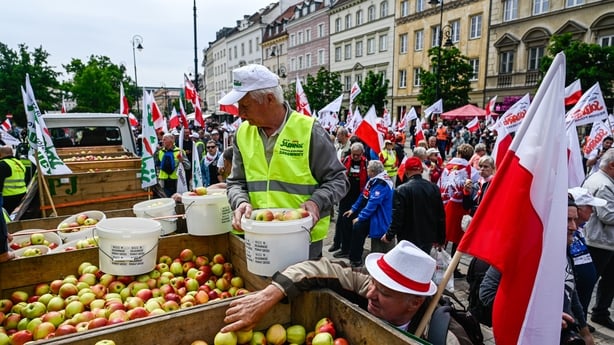For the third time in eight months, Poles will vote in a major election.
Following a record high turnout in last October's parliamentary election, and a much lower turnout in April's local elections, campaigning for the European Parliament elections, to be held on 9 June, has so far been low key.
Election posters, which were widely on display throughout the country for April's local elections, are hard to spot.
The high turnout of 76% in October's pivotal general election was due, in large part, to high numbers of young people and women voting for four pro-EU parties, which came together to form the current government led by Prime Minister Donald Tusk.
But galvanising the same level of support for European elections will be harder and the four coalition parties are campaigning separately.
"The problem with the ruling coalition is that they do not have enough big personalities. There's only Tusk," Bartosz Wieliński, deputy editor of newspaper Gazeta Wyborcza, told RTÉ News.
Mr Tusk and his centre-right Civic Coalition promoted a message of positivity in the lead up to last October's vote, and promised to restore democratic norms after eight years of Law and Justice changes to the judiciary.
However, there is little sign of that kind of positive campaigning in this election, at least at a national level.

National security has become this election's main issue.
This is not surprising given the country's proximity to the war in Ukraine and the Kremlin's heightened rhetoric in the past few weeks over Russia's state of nuclear readiness.
Mr Tusk’s main campaign message is the need to protect Polish national security against Russian threats and has tied Poland’s economic stability, energy independence and a stricter immigration policy to achieving this goal.
At an economic conference in the southern city of Katowice earlier this week, Mr Tusk urged EU member states to collectively increase defence spending by €100 billion in order to "move the war away from European borders, perhaps forever".
"Tusk is playing on fear. There is no hope in the campaign," said Andrzej Bobiński, editor-in-chief of Polityka Insight, adding that "it’s all about trying to defend what’s left".
Turnout will again play a key role, which for European Parliament elections in Poland, hovered between 20 - 25% for three elections between 2004 and 2014.

At the last European elections in 2019, Law and Justice, which governed the country from 2015 to 2023, successfully mobilised its voter base, largely in small towns and rural areas, and turnout jumped to a modest 45%.
It did so by criticising what the party termed as "LBGT ideology", and promoting a strong socially conservative and Catholic doctrine.
On that occasion, the party won 27 MEP seats and forms part of the conservative ECR bloc, which includes Italian Prime Minister Georgia Melloni's Fratelli d’Italia and Spain’s VOX.
"The lower the turnout, the better for Law and Justice," said Mr Bobiński, adding that the party's electorate is "super mobilised".
In 2019, a coalition made up of Mr Tusk's centre-right Civic Coalition, along with other pro-EU parties won 22 seats.
This time around, Law and Justice has focused on criticising the EU’s Green Deal and tapping into anti-Brussels opposition from farmer’s associations against the pact, which requires farmers to use more sustainable agricultural methods.
The irony is that it was a Law and Justice government that accepted the terms of the Green Deal in 2020, though recently former Prime Minister Mateusz Morawiecki said that the current terms of the deal are not what his former government had agreed to.
Thousands of farmers protested again in Warsaw on Friday and Law and Justice leaders joined the march.
However, the farmer movement lacks wide appeal for the electorate and is less formidable since a deal was struck last week to end blockades by Polish farmers of Ukrainian food imports.

This week, national security concerns ratcheted up a notch in Warsaw and could shape the campaign over the coming weeks.
A Polish judge, Tomasz Szmydt, who served on district courts in Warsaw and had access to confidential government documents, claimed asylum in Belarus of all places.
Mr Szmydt’s departure for Minsk shocked senior Polish government ministers and an investigation is under way to determine if he was a spy.
On Thursday, in the Polish parliament known as the Sejm, Mr Tusk launched a damning attack on Law and Justice over the affair.
He described Mr Szmydt as a "Belarusian or Russian agent," designated by Law and Justice to dismantle the Polish legal system and "attack independent Polish judges".
Law and Justice, he said, had been operating "under the influence of Russian interests" for many years in Poland.
Law and Justice has denied any connections to Mr Szmydt.
In 2018, Mr Szmydt was appointed as the director of the legal department of the National Council of the Judiciary, a body that was restructured by Law and Justice.
One political expert said the European elections in Poland are now being played out as "an away game between Germany and Russia on Polish soil".
The reference being that Law and Justice is focusing its campaign on criticising Germany with messages of anti-federalism while Civic Coalition is concentrating on countering Russian threats posed to Polish national security and that the case of Mr Szmydt has only heightened this message.
There may be more to the debate over the Szmydt case than mere politicking.
"The threats are getting real, and now you have the fifth column for Russia within Poland, you could have a rallying effect, around the flag, around the prime minister," said Mr Wieliński.
"There's a real infiltration and real problem with this blindness of Polish secret services, this reluctance to go after Russia, to go after the far-right and investigate this connection," he said.
Strangely, given that it is 20 years since Poland joined the EU, there has been little or no talk from Mr Tusk’s party about that important anniversary in its campaign.
"Donald Tusk is not bringing this 'loving EU’ narrative back," said Wojciech Przybylski, editor-in-chief of Visegrad Insight, a political think-tank in Warsaw.
"He is focusing on being truly European for Polish security interests," said Mr Przybylski, adding that the narrative coming from the government is that it is "determined that Europe must be a tool for our security".
The latest poll by IBRiS on Polish voter intentions for the European elections places support for Law and Justice at 29% just ahead of Civic Coalition on 28%.
The centre-right Third Way party is polling on 12% with the far-right Confederation on 10%, and The Left on 9%.
On Friday, Mr Tusk announced a reshuffle of his cabinet to replace four senior ministers who are contesting seats in June's elections.
Though anticipated for months, the decision to stand four high-profile ministers in June's elections, three of whom belong to Mr Tusk's Civic Coalition, is a signal of intent from his party that it wants to win a larger number of MEP seats than in 2019.







